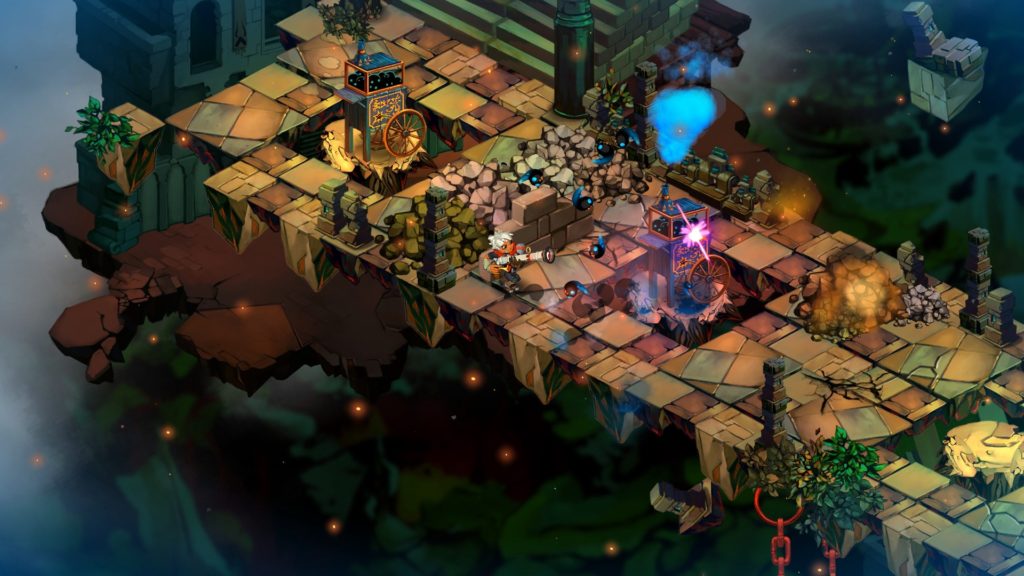What do you do when your world’s been destroyed? That’s the question immediately thrown into the protagonist’s (known only as The Kid) face in Bastion. A minimalist presentation masks fairly heavy themes that would be trite in any other game, but Bastion isn’t just any game: Bastion is a game that shows a clear understanding of the strengths and weaknesses video games have when it comes to storytelling. It doesn’t rely on cinematic crutches to spell out story beats; nor does it drag itself out with complex dialog trees and tertiary reading material – a narrator simply tells you the story as you play, setting up the action as it comes along, perfectly complementing what is otherwise a simple hack-and-slash RPG.
The actual gameplay is simple – from an isometric perspective, the player navigates The Kid through small levels, usually moving from point A to point B to reclaim an important item or fight a boss (and sometimes both). Hordes of enemies and traps block the way forward, and can be dispatched with a mix-and-match assortment of ranged and melee weapons. The Kid can hold two weapons at a time, and each weapon has upgrades that can be bought as the game progresses. The Kid also has special abilities that can be equipped one at a time, ranging from special attack moves to creature summons to hand grenades. While the game initially came out on Xbox 360, Bastion feels totally natural on PC – isometric RPGs are the PC’s strong suit, of course, but the transition is smooth nonetheless.
In fact, for a game that first released on Xbox Live Arcade, Bastion does a great job fitting in with the PC crowd. It’s a bite-sized adventure, to be sure, but it didn’t suffer in the shift to PC. The controls feel excellent, and the hand-drawn art looks fantastic at high monitor resolutions, as opposed to the 720p render size the game had on the 360. There’s even support for Xbox 360 gamepads, although the mouse controls are so tight you’d be hard pressed to need a controller.

As mentioned before, Bastion employs a narrator, who, thanks to masterful voice acting, sets the tone for the action The Kid faces in each level in the game. This narrator isn’t overbearing, and is also fairly static – there are a few moments where his dialog will change based on the player’s input, but for the most part, Bastion follows a set script. It works. It might not be a feat of dynamic engineering, but it’s certainly an inspired way to handle exposition, something that video games struggle with constantly. There are other characters involved in the narrator’s story, but he is the voice of the game.
Underneath the narrator lies a gorgeous soundtrack, too. Even with all its maudlin themes, the whole game has a wonderful swagger to it – twangy guitars, shuffling beats, and plucky banjos are mixed beneath the throaty narrator, making the whole game sound like some bizarre pseudo-western. The art helps, too – the world in Bastion is full of color and charm, despite being set after an apocalypse of sorts. There’s a watercolor vibrance to everything except The Kid himself, who, in 3D, trots through the colorful world with white hair and dark clothes. Because of this, Bastion manages to avoid one of the common hack-and-slash pitfalls – namely, losing sight of the main character. The art provides an excellent contrast that does a good job of keeping everything focused.
The experience is fairly short, but Bastion does provide a new game+ of sorts, where the narration is mostly the same, with a few clever winks to the fact that the player is on another go around. There’s also a scoring system, with items called Idols that toggle different challenges on and off, ala Halo’s skulls scoring modes. These features are secondary to the overall experience, though; a singleplayer game that relies on presentation and story doesn’t really benefit from a leaderboard. It’s a nice way to extend the game, but it almost feels misguided – given Bastion’s asking price, it’d be odd to feel short changed by the adventure in the first place. Luckily, these additions aren’t a hindrance to people who just want to play through a charming story.
Bastion doesn’t need gameplay gimmicks to feel innovative – instead, it plays with presentation in clever ways, and ends up feeling incredibly fresh, despite essentially being action RPG lite. It’s proof that good ideas aren’t always grand ideas, and it never lets its story get in between the player and the action. Instead, it weaves them together at the same time, making a simple story and a simple game feel like so much more.